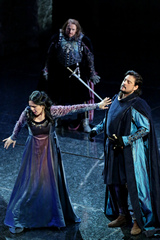| Opera Reviews | 1 May 2024 |
La Scala's revival of Il Trovatore lacks fireby Silvia Luraghi |
|
| Verdi: Il Trovatore Teatro alla Scala, Milan 15 February 2014 |
|
|
Seen again today the production looks quite traditional, featuring large sets, dim lights (by light designer Marco Filibeck) and colorful costumes designed by Leda Lojodice. The director joined the company for the revival, but stage directions remained far from being impressive - the singers moved virtually only when they had to go on or off the stage, and for the rest they stood and sang. Together with the rather routine way in which Daniele Rustioni conducted the orchestra, this made the performance quite unexciting putting all the burden on the voices alone. As opera aficionados virtually know by heart every note of the score, and wait attentively for possible pitfalls in which the singers can encounter problems, and considering that the Milan audience is especially critical and demanding, it is impressive that singers accept to perform in such an opera at La Scala. This is especially true for singers who have an important international career, and are used to being audience favorites in other opera houses, such as Marcelo Alvarez, who appeared in the title role. But it was a good bet for the tenor - his handsome voice, with a warm central register, did not fail to convince the audience, and he was also the only principal who was applauded both during and at the end of the performance. He was in perfect control also in the famous cabaletta ‘Di quella pira’, producing nice high notes, even though the encore was left out. Soprano Maria Agresta was also a compelling Lenora, and in spite of some mixed reaction at the end, her performance was well received. Her sizeable soprano easily reaches the higher register, even if some top notes sometimes can sound somewhat uncovered. Mezzo Ekaterina Semenchuk as Azucena had a good start with her aria ‘Condotta ella era in ceppi’, but then lost control of her voice during the duet with Manrico, and again in the last act. Baritone Franco Vassalli as Count Luna replaced Leo Nucci, who in the meantime announced that he will no longer sing this role. His performance was correct, but remained rather colorless. Bass Kwangchul Youn as Ferrando displayed an unpleasant vibrato in his opening aria. At the end of opening night, boos from the standees in the loggione mostly targeted Semenchuk, Vassalli, and especially conductor Rustioni, reviving the discussion about the biased attitude of the loggionisti toward the artists. There was applause for everyone from the rest of the audience, which featured an especially high number of foreigners and tourists. |
|
| Text ©
Silvia Luraghi Photo © Brescia/Amisano © Teatro alla Scala |

 Verdi's Il Trovatore opened last Saturday at La Scala. The Hugo de Ana production originally premiered on the same stage in 2000, at the opening of the 2000-01 season which celebrated the centennial of Verdi’s death. At that time, the choice of this traditional work was quite untraditional, as it had not been shown at La Scala for over 20 years, and it was due to Riccardo Muti that it was brought back, along with other popular Verdi operas.
Verdi's Il Trovatore opened last Saturday at La Scala. The Hugo de Ana production originally premiered on the same stage in 2000, at the opening of the 2000-01 season which celebrated the centennial of Verdi’s death. At that time, the choice of this traditional work was quite untraditional, as it had not been shown at La Scala for over 20 years, and it was due to Riccardo Muti that it was brought back, along with other popular Verdi operas. 





